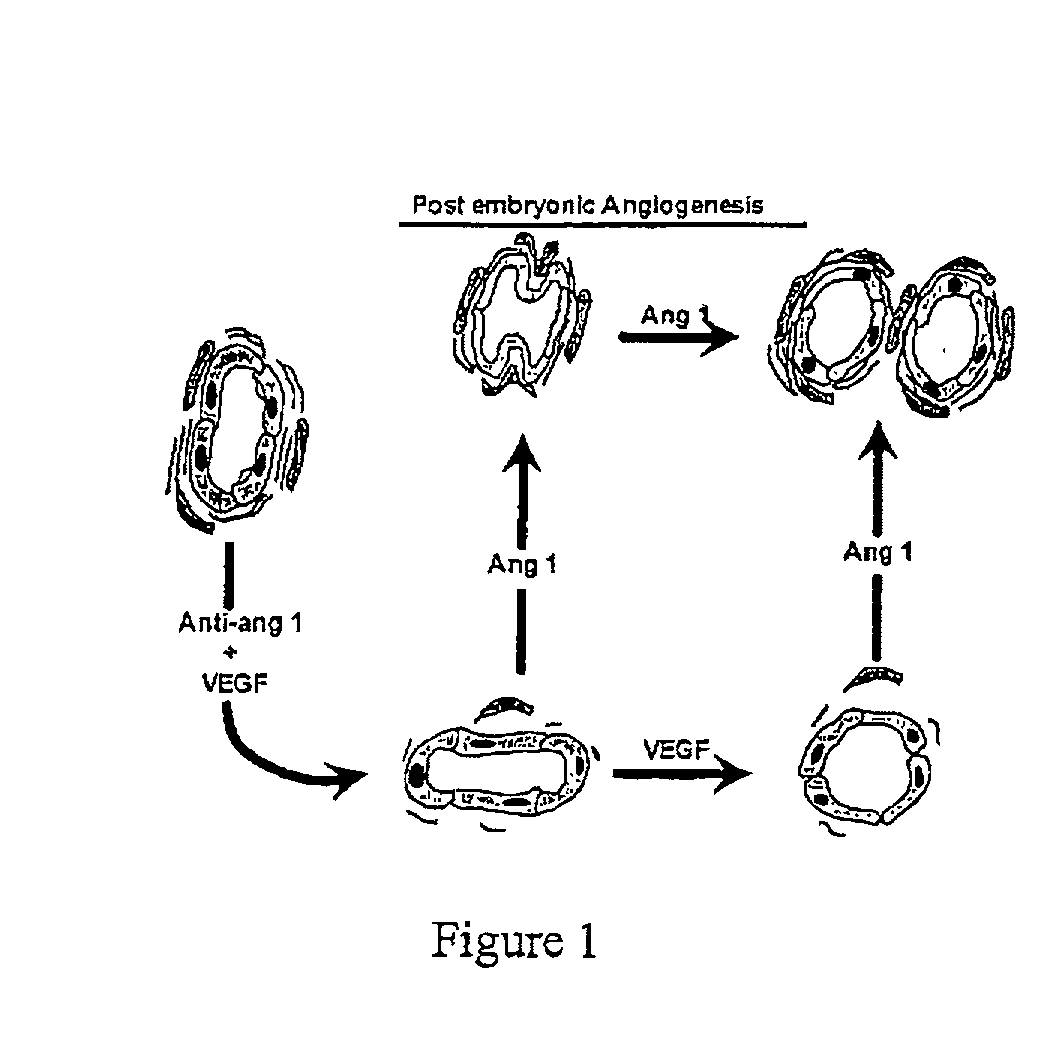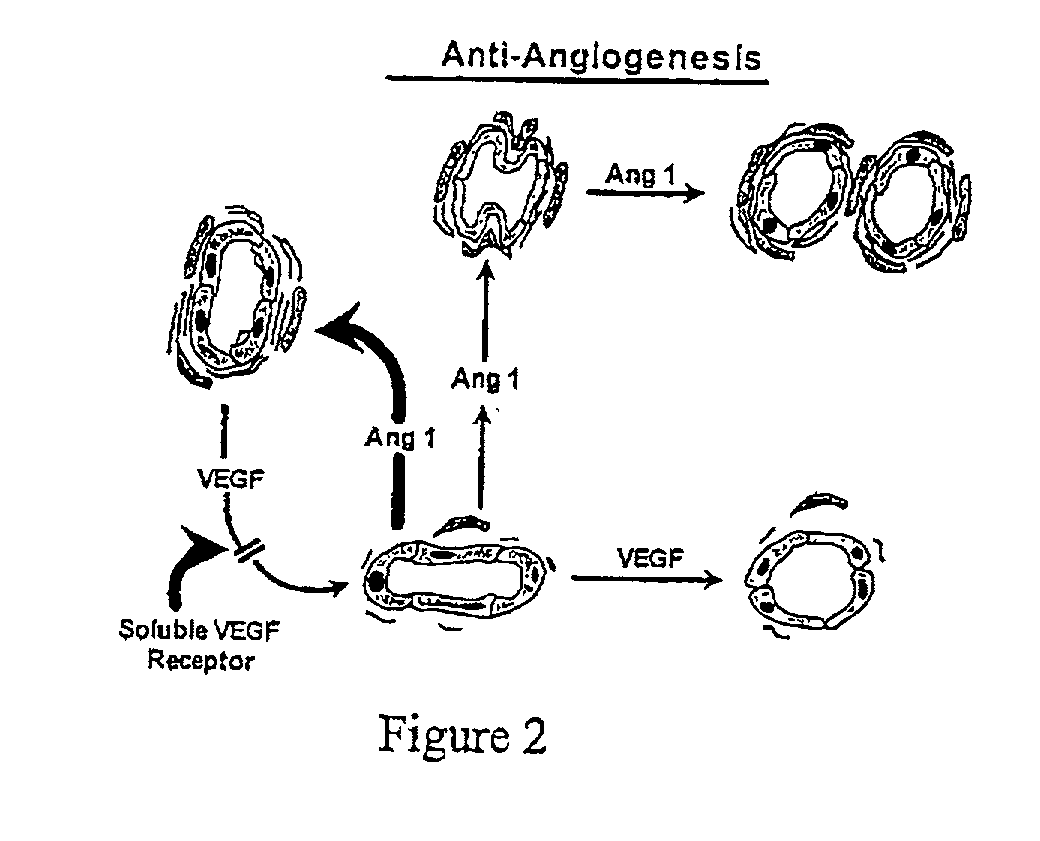Inhibiting development of microvessels withins coronary or peripheral vessel walls for restenosis/atherosclerosis prevention or therapy
- Summary
- Abstract
- Description
- Claims
- Application Information
AI Technical Summary
Benefits of technology
Problems solved by technology
Method used
Image
Examples
example 1
Atherogenesis
[0100] Microvascular angiogenesis (expansion of the vasovasorum) occurs during atherogenesis in the apoE knockout mouse, and the coordinated sequential expression of VEGF and ang-1, with activation of their signaling cascades, are consistent components of the microvascular angiogenic process (see FIG. 1).
[0101] The vessels of apoE knockout mice are compared to those of the parental nonatherosclerostic strain.
[0102] Endpoint Measurements: To determine whether the VEGF and ang-1 signaling cascades are activated during atherogenesis, vessels are obtained from the parental non-atherosclerotic mice and compared to vessels obtained at various timepoints from apoE knockout mice and analysed for one or more or any or all of:
[0103] ang-1 protein (by immunohistochemistry and / or by Western analysis);
[0104] tyrosine kinase phosphorylation of TIE 2 (to assess the state of activation of the receptor);
[0105] VEGF protein (by immunohistochemistry and / or by Western analysis);
[0106] tyro...
example 2
[0123] Microangiogenesis (expansion of the vasovasorum) occurs during neointimal development following angioplasty (with or without stents), and the coordinated sequential expression of VEGF and ang-1, with activation of their signaling cascades, are consistent components of the microvascular angiogenic process.
[0124] The coronary vessels of pigs are injured by balloon angioplasty with or without stent implantation. To determine whether the VEGF and ang-1 signaling cascades are activated following vessel injury, vessels are obtained from each of 2 pigs sacrificed 2 h, 6 h, 24 h, 14 days and 28 days after injury and analysed.
[0125] Endpoint Measurements are one or more or any or all of:
[0126] ang-1 protein (by immunohistochemistry and / or by Western blot);
[0127] tyrosine kinase phosphorylation of TIE 2 (to assess the state of activation of the receptor);
[0128] VEGF protein (by immunohistochemistry and / or by Western analysis);
[0129] tyrosine kinase phosphorylation of one or m...
example 3
Formulations and Use
[0151] The soluble VEGF receptor, and / or other VEGF inhibitors identified in the foregoing text and ang-1 and / or other vessel maturation inducers are admixed with carrier, diluent etc., as herein described in amounts as herein described to obtain formulations. DNA encoding VEGF inhibitors such as the soluble VEGF receptor and vessel maturation inducers such as ang-1 are used to generate recombinants and DNA expression systems expressing these agents; and, these recombinants and DNA expression systems are admixed with carrier, diluent, etc., as herein described to obtain formulations. Patients are administered the formulations as herein described for the prevention and / or treatment of vascular disease such as atherosclerosis and / or restenosis, including in a manner analogous to gene therapy directed against SMC proliferation, as described in literature cited herein or in documents cited in literature cited herein.
[0152] Having thus described in detail preferred em...
PUM
| Property | Measurement | Unit |
|---|---|---|
| Solubility (mass) | aaaaa | aaaaa |
Abstract
Description
Claims
Application Information
 Login to View More
Login to View More - R&D
- Intellectual Property
- Life Sciences
- Materials
- Tech Scout
- Unparalleled Data Quality
- Higher Quality Content
- 60% Fewer Hallucinations
Browse by: Latest US Patents, China's latest patents, Technical Efficacy Thesaurus, Application Domain, Technology Topic, Popular Technical Reports.
© 2025 PatSnap. All rights reserved.Legal|Privacy policy|Modern Slavery Act Transparency Statement|Sitemap|About US| Contact US: help@patsnap.com


